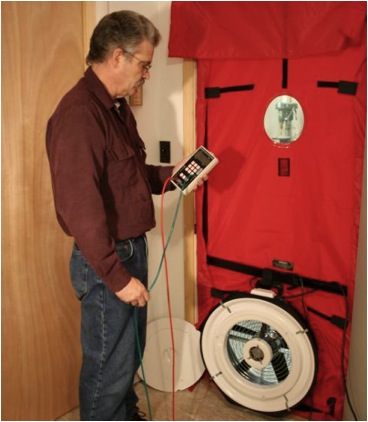No products in the cart.
Energy Auditor Job Profile: What Energy Auditors Do
In a previous post, I wrote about the factors driving residential energy efficiency. Now that we’ve explored why there is a growing demand for energy auditors, let’s take a look at what the energy auditor job actually entails.
An energy auditor’s main goal is to identify and prioritize opportunities for energy savings through data analysis, visual inspection, and the use of various diagnostic tools.
The auditor begins by visually inspecting the exterior of the home, looking for clues of energy waste, ventilation, or drainage problems. On the inside of the home, the auditor will look for obvious signs of air flow problems, measure insulation value in the attic, and search for any gaps within the home that could be causing drafts and air leakage. The auditor will also set up a blower door test to measure air exchange. Once the blower door is running, the auditor can use thermal imaging to find any cold spots or voids of insulation in the wall. Depending on the type of audit, an auditor may also perform a combustion safety test, duct testing, and energy modeling.
Finally, the energy auditor job includes preparing a report to explain any issues that were uncovered. The report will include recommended solutions and potential cost savings associated with each measure, allowing homeowners to prioritize repairs and upgrades. Recommendations may include attic insulation, energy efficient appliance and lighting upgrades, window retrofits, and heating and air conditioning system upgrades.
What does it take to become an energy auditor?
To demonstrate knowledge and qualifications in energy auditing, there are two nationally recognized standards for energy auditors: BPI Building Analyst and RESNET HERS Rater. Both emphasize the house-as-a-system approach to evaluating performance, including a blower door test. Both also teach the same building science principles. Most incentive programs require an energy audit by an individual accredited by one of these organizations in order to qualify for the program.
So, which accreditation is right for you and your career path? That all depends on the type of work you prefer to do.
 The Building Performance Institute (BPI) accreditations focus more on retrofits of existing residential construction. There are multiple accreditations available beginning with Building Analyst and extending into specialty certifications such as Infiltration and Duct Leakage, Building Envelope Professional, Whole House Air Leakage Control Installer, Multifamily Building Analyst, Heating Professional, and AC/Heat Pump Professional. BPI certification has been a critical component of many weatherization programs designed to provide financial assistance to low-income families for energy efficiency upgrades.
The Building Performance Institute (BPI) accreditations focus more on retrofits of existing residential construction. There are multiple accreditations available beginning with Building Analyst and extending into specialty certifications such as Infiltration and Duct Leakage, Building Envelope Professional, Whole House Air Leakage Control Installer, Multifamily Building Analyst, Heating Professional, and AC/Heat Pump Professional. BPI certification has been a critical component of many weatherization programs designed to provide financial assistance to low-income families for energy efficiency upgrades.
The Residential Energy Services Network (RESNET) uses a nationally recognized system for inspecting and calculating a score for a home’s performance using the Home Energy Rating System (HERS). A HERS Rater is trained to do both home energy ratings and home energy audits. Home energy ratings generally apply to new home construction or major remodeling. Because energy modeling and duct blaster testing are included in the protocol, RESNET HERS ratings are ideal to predict the energy performance of a new home and identify cost-effective options for improved energy efficiency. A RESNET HERS rating is required for a new home to qualify for the ENERGY STAR Homes designation and an energy efficiency mortgage.
How can Everblue help you get started?
Everblue is the nation’s leading provider of sustainability education and certification with energy efficiency training available nationwide. Everblue’s energy auditing courses include classroom training focused on building science, hands-on field training using diagnostic equipment, and both written and field exams. Everblue instructors are experienced, certified professionals with a disciplined and practical approach to education.
Green jobs have emerged as the quintessential hope for a healthier environment and a stronger economy. Everblue’s training programs will put you on a path to an enhanced career or a new career as a leader in a growing green economy.

